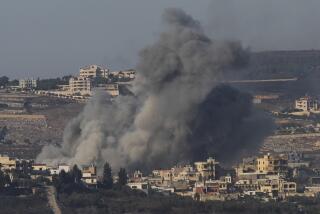Sarajevo-Area Serbs Panic at Order to Leave
- Share via
VOGOSCA, Bosnia-Herzegovina — Hundreds of confused residents, some blinded by tears and others by anger, crowded the town hall here Tuesday in a desperate effort to find a way out of this Sarajevo suburb after Bosnian Serb authorities announced that everyone should leave by Friday.
Heavy snow and poor organization made a large-scale evacuation impossible, but residents pressed through crowded hallways to get property records and resettlement information before preparing for the uncertain journey to villages deep in Bosnian Serb territory.
“My father said to come here because there were supposed to be buses,” said Branislav Kachansky, anxiously roaming the corridors with his wife. “But I don’t believe the buses are coming. And without them, a lot of people don’t have the money to leave on their own.”
Vogosca Mayor Rajko Koprivica said that more than 1,000 people turned up at the municipal building, which was particularly ill-suited for the barrage because it was undergoing an evacuation of its own.
Office furniture was being dragged into hallways and loaded onto trucks, while city workers hastily packed up files, some spilling on the floor. The police chief, who will lose his job on Friday when Bosnian Serb authorities hand over control to the Muslim-led Bosnian government, busily worked one corridor, removing chairs from offices and lining them up against a wall for packing.
“I have a bad feeling because I cannot really help these people,” said Koprivica, who has urged residents to stay in Vogosca. “I believe things won’t change here, but the people don’t believe that. They don’t believe anyone anymore.”
Residents were startled at an announcement on Bosnian Serb television Monday night that everyone should clear out by the weekend and that transportation, including more than a dozen buses, would be provided by Bosnian Serb authorities from Pale, their headquarters.
Most people thought the transfer of authority would not occur until March 19, but U.N. officials disclosed Monday that the hand-over will come gradually in the five Serbian suburbs of Sarajevo, beginning this week with Vogosca.
One woman, whose husband was killed in the war, collapsed in the mayor’s office out of fear that she might be left behind in the sudden rush, Koprivica said. Telephone communications between Vogosca and Pale were down because of a severe winter storm, making it impossible for the harried mayor to find out when the promised buses would arrive. They never did.
“It is wrong what is going on here,” said Novica Kosarac, who came to collect official papers on his apartment. “It is causing panic.”
Koprivica said Bosnian Serb authorities should be criticized for making “illogical statements” that seemed to be inciting a frantic exodus, but he also blasted international relief organizations for doing nothing to help the thousands of despairing residents too afraid to stay but overwhelmed by the prospect of moving.
“They are here, but they aren’t helping us,” said Koprivica, rubbing his temples. “It would be easier with their help, but we are left with no choice but to do this on our own.”
A spokesman for the U.N. refugee agency, which opened an office in Vogosca on Tuesday, acknowledged that the organization was doing nothing to ease the pain of the ongoing departure. The office, he said, was opened to monitor the comings and goings of refugees, not assist in the “ethnic cleansing” of the Sarajevo suburbs, which he said is the aim of the Bosnian Serb effort to evacuate Vogosca.
“This is all part of a campaign of manipulation to get the people out and create a psychosis,” said Kris Janowski of the Office of the U.N. High Commissioner for Refugees. “We are not going to assist them in leaving Sarajevo.”
A deputy to the U.N. high representative for Bosnia-Herzegovina--whose office is responsible for putting into effect the nonmilitary provisions of the peace agreement reached in Dayton, Ohio, last fall--said it would be wrong for international organizations to assist people in fleeing.
“We will not be part of creating new refugees,” said Michael Steiner. “There is no reason for people to leave.”
In Mostar, another ethnically split Bosnian city that has been a flash point in recent weeks, Tuesday was the first day of joint Muslim-Croat police patrols and free movement in the city.
About 300 Muslims crossed into Croat-held areas, but tensions rose when a car with several Muslim youths crashed into a tree on the Croatian side of town. One of the Muslims was reportedly beaten by Croats, who also fired shots into the air, and at least three were arrested.
Also, the joint police patrols, the first since Croats and Muslims fought a fierce war in 1993-94, started several hours late.
But European Union officials, who administer Mostar, downplayed the problems, saying Tuesday was a historic day for the troubled city.
“This is an important step. Now we have a police who will enforce security, which will not be divided on an ethnicity basis but according to training,” EU administrator Hans Koschnick told a news conference.
More to Read
Sign up for Essential California
The most important California stories and recommendations in your inbox every morning.
You may occasionally receive promotional content from the Los Angeles Times.












